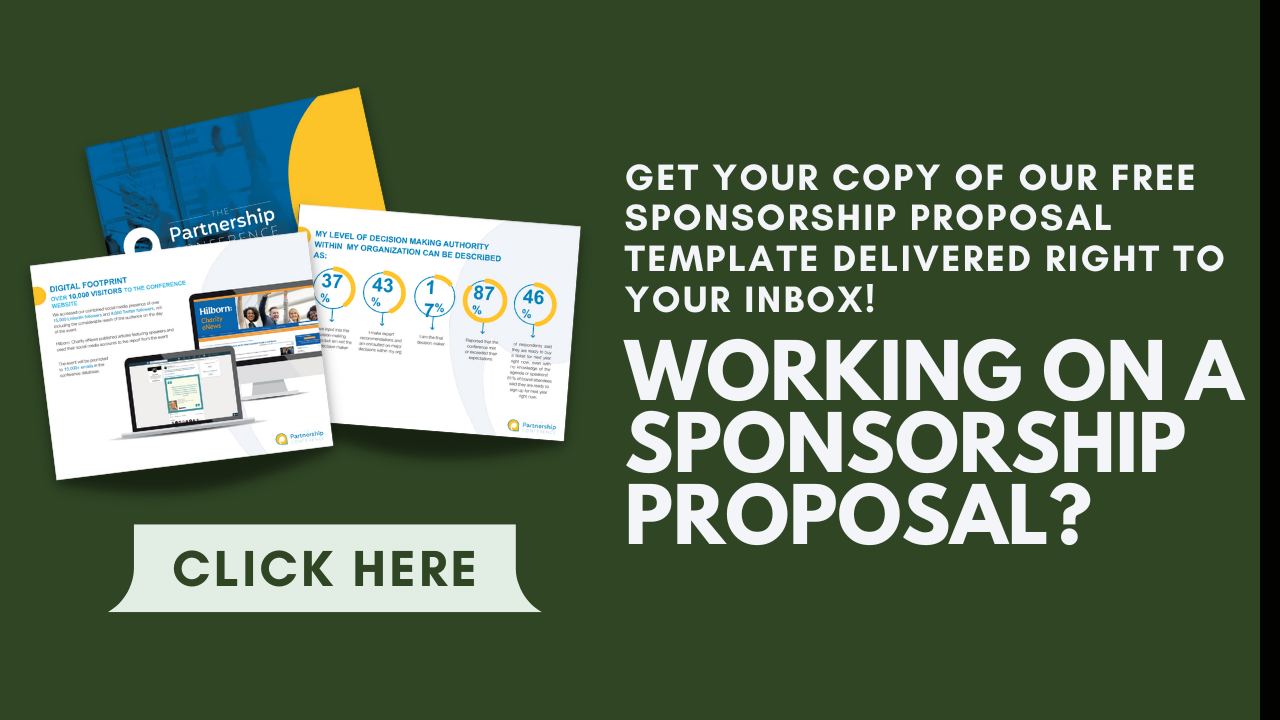
Before you dive in, if you are interested in sponsorship naming rights, check out these titles in our “sponsorship for naming rights” series:
Sponsorships offer a plethora of opportunities to gain both financial support and brand recognition. What you offer sponsors and who you offer sponsorship to makes a big difference in the results you can expect. When it comes to sponsorships, many corporations and brands are ready to leap at the chance to see their name partnered with yours. One of the first things you’ll want to understand is the rights you are willing to agree to with potential sponsors and how you can convince sponsors you have much value to offer.
The good news is, there are always corporations looking for sponsorship opportunities and you might be able to deliver just what they want whether it is their name up in lights on a pro sport stadium, their brand and logo in the title of a high profile event, or being included as one of many prominent presenters at your event. The goal of sponsors is to increase market share, while yours is to make the right match for the right price. Here we take a deep dive into title sponsorship, naming and presenting rights comparing the terms, what they entail and how best to use them.
Usually placed on buildings, rooms, stadiums etc. It is an investment made by larger corporations that want to boost brand recognition to remain relevant and visible in a prominent, well-traveled area. That is why there are a growing number of stadiums named after prominent corporations. In fact, 26 of the 32 stadiums for the NFL are branded.
Some examples would be:
Usually for events, programs etc. and includes the brand name in the wordmark such as “The Company XYZ Wellness Expo.” This would be an exclusive sponsorship in most cases.
Are similar to naming rights but do not have the name in the actual wordmark so would appear within the title, but not part of the name such as “The Napa Auto Parts 200 presented by Dodge.” Presenting rights may or may not include exclusivity.
Now that you understand the basics for each sponsorship opportunity, let’s look at why a company would choose the option.

Large corporations have caught on that naming rights give them plenty of bang for their buck. It is the top of the tier when it comes to exposure as well as the privilege of total exclusivity. A simple example is the Super Bowl. While the stadiums participating in the event, or even during the playoffs are mentioned frequently, the company gets the benefit of having their name repeated over and over again throughout the event and season.
The buildup can last for days, weeks or even months for such events, and while a time slot for a TV ad during Super Bowl 2020 cost as much as a record $5.6 million for just 30 seconds, the stadium received significant publicity across not just television but online, print, billboards, radio and more for an entire season or multiple years. Despite the high cost, Super Bowl ads are some of the most coveted spots of the year, and sell out months, or even years, in advance.
And let’s not forget that many stadiums/arenas are hosts to more than one sport. Often, major city venues cater to all four major sports and the more successful the team, the more positive the association is for the brand. Of course, the venues also provide other sources of entertainment with more exposure gained for live concerts.
Although you can’t necessarily target a specific audience with naming rights, the broad cross-section of demographics does its job well. In most cases, the brands that opt for naming rights understand this and are fine with having their name out there to reach as many people as possible. Whether it is simple foot and vehicle traffic on a daily basis, exposure via an event or even the added ability to provide some freebies now and then to enhance the consumer experience, naming rights offer exposure that is hard to beat. Sponsors also have years or even perpetual exposure with the option to renew their rights, or at least have a long-term agreement that can last decades.
Title sponsorships might be more appealing to some companies because they can prove to be cost-effective while also offering the opportunity to be a little more targeted when it comes to the audience. It is more community based which can make it more attractive to local businesses and allows participants to get exposure for their company name, trademarks/logo and their products.
As with naming rights, title sponsorships do usually provide exclusivity, although there can be cases where the sponsorship is shared. When associated with an event, title sponsorship advertising for promotion can go on for weeks, months or even a year depending on the nature of the event. This can span wide-reaching exposure with visibility to the targets most relevant to the brand. Every ad will include the company name and logo from online banners to print and radio to television for some events.
For high profile events, brands can also gain media exposure through PR. Large events will send out ongoing press releases to help build up momentum for their event and to build awareness in the community. Every mention of the event in the media means more exposure for title sponsorship brands. And there is also post-event exposure through media, as well as other channels, especially social media. Much of this is passive advertising with attendees posting event information, images and videos. This info can go viral and bring more awareness to a brand.
Once the event arrives, the entire venue will be dripping with the sponsor’s brand name and logo. Every sign, banner, tote bag, t-shirt, and other marketing materials will be emblazoned with the brand. The longer the event runs, the more exposure they receive. Most events will provide the opportunity for sponsors to participate in some way.
They might be offered the chance to run ads on large screens, make announcements every hour, or have a prominent booth or keynote speakers appear. If there are seminars or other presentations or forms of entertainment, title sponsors can also have the chance to be involved or sponsor these elements of the event as well. Handouts are also usually welcome for title sponsors.
Most events will provide title sponsors with an allotment of complimentary tickets they can use for promotional purposes such as contests or a gift with purchase for their customers. Some event sponsorships can have a direct impact on sales by allowing title sponsors the option for their customers to present a recent proof of purchase for free entry or a discount to the event.
For larger events that offer a sponsorship proposal with ticket purchases, title sponsors can contribute a number of valuable marketing materials. This can include brochures about products and services but can also include coupons to increase purchases.
While presenting rights aren’t the cream of the crop for sponsorships, they are the most cost-effective choice when compared to naming rights and title sponsorship. As mentioned in our definitions, presenting rights provides sponsors with a prominent spot for event marketing, but might be shared with other relevant sponsors. This is not a bad thing, as it will often associate participants with prominent brands that make good sense and creates a positive association for the brand’s audience. For example, for a wellness expo, it doesn’t do any harm for a prominent vitamin company to be named alongside a popular vegan/all-natural cosmetic or personal care brand.
Presenting rights often offer the same types of marketing perks as title sponsors, just with less prominence. So anywhere the event is mentioned or advertised it will include a presented by: Presenter name and logo here. Also, as with title sponsors presenters are reaching the right target audience for their brand.
The beauty of sponsorships is they come in all different levels. You can cater to a long list of prospects when you combine presenting and title sponsors. You need a single title sponsor who will pay out a larger amount of money for the exclusive rights and then seek out several sponsors with presenting rights. When done right, not only do you gain prominence through association, but you can also leverage high profile brand sponsorships as a selling feature to attract other sponsors.
Where this gets dicey is when you get too close in products and services offered by brands. While on the surface you might not view them as competitors, the brand might feel otherwise. Because of this, it is a good idea to ask for a list of competitors once you sign someone on so you can avoid conflicts. As well, you want to be very careful not to throw in companies that might strongly be averse to each other’s cultures. For example, if your title sponsor has publicly spoken out against unethically sourced chocolate or coffee or something like child labor for producing clothing for fashionable brands, then you would want to avoid a presenter who might have made the headlines for participating in such practices.

The search for the right event sponsor can be completely wasted if you don’t have a good grasp of who you should approach. While it might seem all’s fair in love and war, there is no point wasting your efforts on approaching a plastic straw company to sponsor your eco-friendly expo. Although you want the revenue generated by sponsorships, you can’t accept just any sponsor. In fact, for higher profile events, you might even be approached by companies willing to invest in some form of sponsorship, but they are totally inappropriate for your event.
So, you will have to spend some time evaluating potential sponsors to help you narrow down your search, while also providing you with a list of relevant brands that make the most sense for a partnership. Of course, the brands that will be relevant to your needs will vary depending on the “level” of sponsor you are seeking.
It can be pretty simple to come up with a solid list of prospects. You need to consider:
Although your audience is the key to coming up with a list of prospects for a title and presenting sponsors for naming rights, if you have a high traffic area, you can appeal to a far broader list of companies because traffic outweighs the importance of audience. So, in the case of naming rights just about any major corporation might be an option for say a stadium, whereas if it were for the purposes of naming a wing in a hospital or a library in a college, you can be more specific with your audience.
That aside we can now take a look at title and presenting sponsors. When you consider your audience(s), you can come up with a group of prospects and then get more specific with a list of brands that fall under those groups. For example, if your audience is dentists and you are selling seminars, keynote speaker gigs, booths and sampling, educational opportunities and free giveaways you can speak to insurance companies, dental equipment companies, audio/visual companies, coffee/water dispenser companies, gum companies, oral care product companies, and even go for some high-end auto companies since dentists do quite well. If your event is local, reach out to companies in the community when possible such as your local insurance brokers, audio/visual installation companies, dental office interior designers and local car dealerships.
If you’ve gotten this far, congratulations. Negotiations mean a prospect is seriously considering sponsorship but has still not signed on. At this point, your best course of action is to remain genuine and let people see you are passionate about your event and what it has to offer. Be ready to offer easy conversation to continue to build momentum in the relationship and then discuss the benefits of sponsorship by showing them how much you know about their brand. Some things to consider include:
This is the time to be certain, or pretty darn sure you understand their motivation to considering sponsorship. Are they philanthropists? Are they trying to build brand awareness? Are they looking to hook their red wagon to your marketing opportunities? If you know what is driving their interest, focus on that when continuing your pitch and benefits. This will lead to ROI on the sponsorship investment and trying to prove value and price will often depend on this. Have some numbers ready to justify the spend.
If you feel you are losing them, consider offering them a unique opportunity in hand with the sponsorship they are considering. Is there something they said in their objections that might provide a hint to what they feel is missing? Is there something you know they did in the past at other events you haven’t offered them? New ideas will get them thinking again, so you can continue the negotiation process and avoid them walking away.
They might be floundering because they aren’t convinced you have their best interests at heart. They might think you just want their money and aren’t considering how giving you the money will help them. What can you offer them, that they might have missed in your original pitch? Can you provide them with exposure to potential talent they can recruit? Is your social media prominent enough that you can help build their status as a thought leader? Do you have a killer mailing list they can access? Are they missing a key advantage of being aligned with your event? Tap into this, and you are golden.
Much like switching up the offer, you might be missing something that is making them hesitate. The best way to overcome this hurdle is to provide a completely customized sponsorship option. Although for the most part, you are selling similar sponsorship opportunities, especially for presenting rights, the key is to zone in on something additional, or special that will customize their sponsorship package and in essence create something more exclusive.
For example, is there a more prominent stage at the event where they can have exclusive branding? Is there a welcome cocktail party or café they can host? Is there something unique about their product or service that might be deserving of a special giveaway, demo, or even offering them a dedicated time of day when they can do something different than other sponsors? Customization is the additional piece of value that can push them to sign on the dotted line.
Knowing how much to charge sponsors is essential for this type of sponsorship. The volume of eyeballs, interactions, mentions etc. could be in the tens or hundreds of millions depending on broadcast rights and geography. This is not the time to guess at your value, you must do a proper, thorough valuation.
We know it can be to your benefit to offer a fresher, more unique list of assets to presenters or even title sponsors for that matter. But what can you do to sweeten the pot? When you are looking for added benefits for sponsors consider some of these outside of the box ideas:
There really is no end to the added assets you can offer, and don’t be shy to ask for suggestions from the prospects themselves. Getting the name game right will provide you with funding to improve your events, while adding credibility when you partner with the right brands. When it comes to naming rights, stadium and arena owners have the perfect solution to monetize their sponsorship funding up-front. This goes a long way during the construction phase, as it provides an additional source of money to go towards the construction project. You hold the key to a captive audience that sponsors are anxious to reach. When you understand how to sell that audience, you are more likely to succeed.


Chris Baylis is the Founder and Editor-in-Chief of The Sponsorship Collective.
After spending several years in the field as a sponsorship professional and consultant, Chris now spends his time working with clients to help them understand their audiences, build activations that sponsors want, apply market values to their assets and build strategies that drive sales.